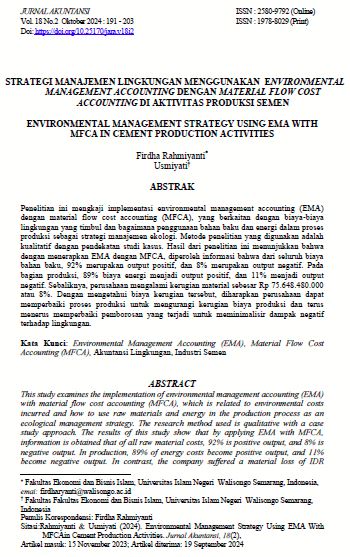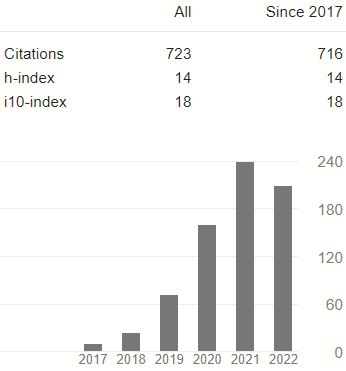ENVIRONMENTAL MANAGEMENT STRATEGY USING EMA WITH MFCA IN CEMENT PRODUCTION ACTIVITIES
DOI:
https://doi.org/10.25170/jak.v18i2.4912Keywords:
Environmental Management Accounting (EMA), Material Flow Cost Accounting (MFCA), Akuntansi Lingkungan, Industri SemenAbstract
Penelitian ini mengkaji implementasi environmental management accounting (EMA) dengan material flow cost accounting (MFCA), yang berkaitan dengan biaya-biaya lingkungan yang timbul dan bagaimana penggunaan bahan baku dan energi dalam proses produksi sebagai strategi manajemen ekologi. Metode penelitian yang digunakan adalah kualitatif dengan pendekatan studi kasus. Hasil dari penelitian ini menunjukkan bahwa dengan menerapkan EMA dengan MFCA, diperoleh informasi bahwa dari seluruh biaya bahan baku, 92% merupakan output positif, dan 8% merupakan output negatif. Pada bagian produksi, 89% biaya energi menjadi output positif, dan 11% menjadi output negatif. Sebaliknya, perusahaan mengalami kerugian material sebesar Rp 75.648.480.000 atau 8%. Dengan mengetahui biaya kerugian tersebut, diharapkan perusahaan dapat memperbaiki proses produksi untuk mengurangi kerugian biaya produksi dan terus menerus memperbaiki pemborosan yang terjadi untuk meminimalisir dampak negatif terhadap lingkungan.
References
Azizah, N., A.R., M. D., & Endang, M. G. W. (2011). Analisis Environmental Management Accounting (EMA) sebagai Bentuk Eco-Efficiency dalam Meningkatkan Keunggulan Kompetitif Perusahaan. Analisis Penerapan Environmental Management Accounting (EMA) sebagai Bentuk Eco-Efficiency dalam Meningkatkan Keunggulan Kompetitif Perusahaan, 6(2), 1–10. https://media.neliti.com/media/publications/78000-ID-analisis-penerapan-environmental-managem.pdf
Bennett, M. D., Bouma, J. J., & Wolters, T. J. (Eds.). (2002). Environmental management accounting: Informational and institutional developments (Vol. 9). Springer Science & Business Media.
Chikmatin, E. (2019). Analisis Implementasi Environmental Management Accounting sebagai Bentuk Eco-efficiency pada CV.Mikado. Seminar Nasional Ekonomi & Bisnis Dewanatara Call For Peper 2019, 1–12.
Cho, C. H., Freedman, M., & Patten, D. M. (2012). Corporate Disclosure of Environmental Capital Expenditures: A Test of Alternative Theories. Accounting, Auditing and Accountability Journal, 25(3), 486–507. https://doi.org/10.1108/09513571211209617
Christ & Burrit. (2018). Material flow Cost Accounting for Food Waste in the Restaurant Industry. The Eletronic Library, 34(1), 1–5.
Creswell, J. W. (2003). Qualitative, Quantitative, and Mix Methods Approaches. Second Edition. Sage Publication.
Dana, G. (2018). Analisis Biaya Lingkungan (Studi Kasus Pada PT. Semen Tonasa Di Kabupaten Pangkep). 45–50.
Fitri, S. (2011). Akuntansi dan Laporan Keuangan untuk Biaya Lingkungan dan Kewajiban Lingkungan. Juris, 10(1), 270177.
Hadari, N. (2003). Metode Penelitian Bidang Sosial. Gajah Mada University Press.
Jargalsaikhan, B. E., Ganbaatar, N., Urtnasan, M., Uranbileg, N., Begzsuren, D., Patil, K. R., Mahajan, U. B., Unger, B. S., Goyal, S. N., Belemkar, S., Surana, S. J., Ojha, S., Patil, C. R., Mansouri, M. T., Hemmati, A. A., Naghizadeh, B., Mard, S. A., Rezaie, A., Ghorbanzadeh, B., … Yuanita, E. (2019). Pengaruh Kualitas Pelayanan Terhadap Kepuasan Konsumen Pada Hotel Pop Di Bandar Lampung. Molecules, 9(1), 148–162.
Loen, M. (2018). Penerapan Green Accounting dan Material Flow Cost Accounting (MFCA) terhadap Sustainable Development. Jurnal Akuntansi dan Bisnis Krisnadwipayana, 5(1), 1–14. https://doi.org/10.35137/jabk.v5i1.182
Marota, R. (2017). Green Concepts and Material Flow Cost Accounting Application for Company Sustainability. Indonesian Journal of Business and Entrepreneurship, 3(1), 43–51. https://doi.org/10.17358/ijbe.3.1.43
Meilanawati, R. (2009). Analisis Pengungkapan Biaya Lingkungan (Environmental Costs) pada PT Semen Indonesia Persero, Tbk. 1–20.
Savage, D. E., Ligon, P. J., & Lomsek, J. (2001). Environmental Management Accounting: Policies and Linkages.
Schaltegger, S., Hahn, T. & Burritt, R. (2000). Environmental Management Accounting for, Overview and Main Approaches. Centre Management., Sustainability.
Schaltegger, S., Hahn, T., & Burritt, R. (2000). Environmental Management Accounting: Overview and Main Approaches. Centre for Sustainability Management, 1–23.
Syarif, A. M., & Novita, N. (2019). Environmental Management Accounting with Material Flow Cost Accounting: Strategy of Environmental Management in Small and Medium-sized Enterprises Production Activities. Indonesian Management and Accounting Research, 17(2), 143. https://doi.org/10.25105/imar.v17i2.5313

Downloads
Published
Issue
Section
License
Copyright (c) 2024 Firdha Rahmiyanti, Usmiyati Usmiyati

This work is licensed under a Creative Commons Attribution-ShareAlike 4.0 International License.
Authors who publish with this journal agree to the following terms:
- Authors retain copyright and grant the journal right of first publication with the work simultaneously licensed under a Creative Commons Attribution-ShareAlike 4.0 International License that allows others to share the work with an acknowledgment of the work's authorship and initial publication in this journal.
- Authors are able to enter into separate, additional contractual arrangements for the non-exclusive distribution of the journal's published version of the work (e.g., post it to an institutional repository or publish it in a book), with an acknowledgment of its initial publication in this journal.
- Authors are permitted and encouraged to post their work online (e.g., in institutional repositories or on their website) prior to and during the submission process, as it can lead to productive exchanges, as well as earlier and greater citation of published work.














